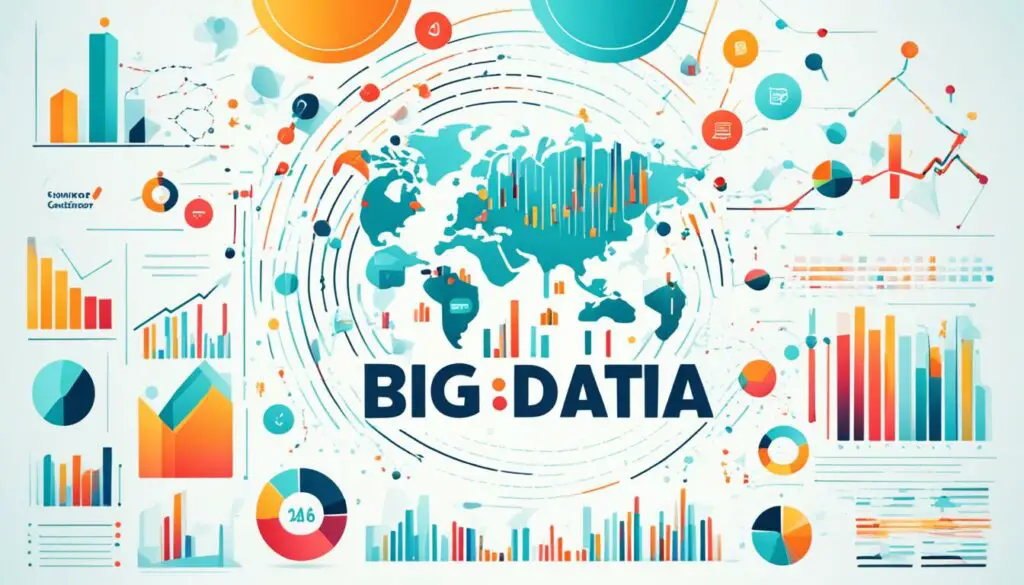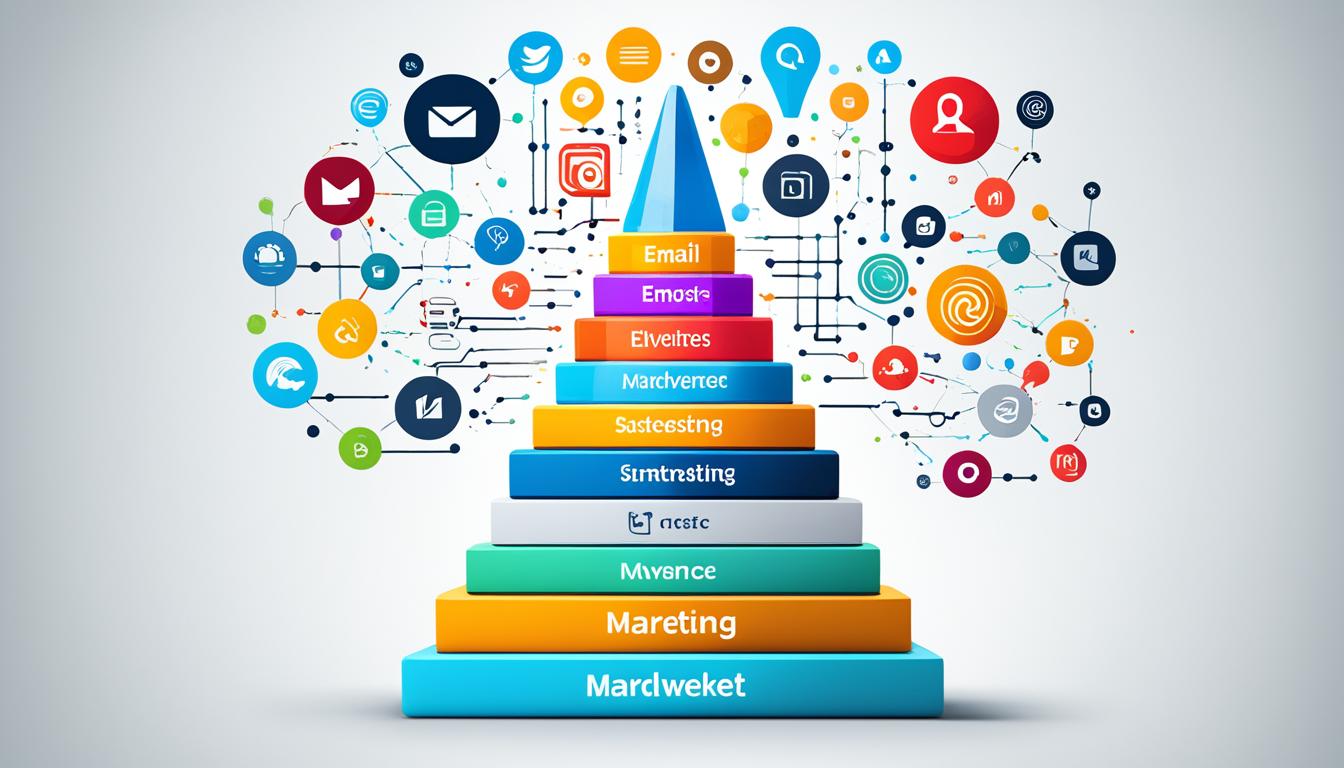In today’s digital age, businesses have access to an enormous amount of customer data. This data holds immense potential for driving growth and improving sales and marketing strategies. Big data analytics is a powerful technology that allows businesses to extract valuable insights from their data and use those insights to enhance their sales and marketing efforts.
By utilizing data analytics, businesses can gain a deeper understanding of their customers’ needs, behaviors, and preferences. This enables them to create targeted marketing campaigns that resonate with their target audience. With big data, businesses can personalize their marketing messages and deliver the right message to the right customer at the right time. This level of personalization can significantly increase the chances of making a successful sale.
Another significant benefit of using big data in sales and marketing is the ability to improve customer satisfaction. By analyzing customer data, businesses can identify opportunities for improvement and make data-driven decisions to optimize their offerings and services. Additionally, big data can help businesses optimize pricing strategies by analyzing customer purchase history and behavior.
However, leveraging big data effectively does come with its challenges. The technology involved in collecting, analyzing, and interpreting big data can be complex and requires expertise. Data privacy and security concerns also need to be addressed to ensure the ethical use of customer data.
Key Takeaways:
- Big data analytics provides valuable insights into customer needs, behaviors, and preferences.
- Targeted marketing campaigns based on big data analysis can increase the chances of sales success.
- Personalization of marketing messages improves customer satisfaction and loyalty.
- Big data analysis helps optimize pricing strategies based on customer behavior and purchase history.
- Effectively leveraging big data requires expertise and addressing data privacy and security concerns.
Benefits of Using Big Data in Marketing
Using big data in marketing offers numerous benefits for businesses. By leveraging data analytics and insights, businesses can optimize their marketing strategies, improve customer satisfaction, and drive growth. Let’s explore the key benefits of incorporating big data in marketing:
1. Targeted Marketing Campaigns
One of the greatest advantages of big data in marketing is the ability to create targeted campaigns. By analyzing customer data and understanding their needs and preferences, businesses can tailor their marketing efforts to specific segments of their audience. This leads to higher engagement rates and a greater chance of conversion.
2. Customer Personalization
Personalizing marketing messages is crucial for building strong customer relationships and improving customer loyalty. Big data enables businesses to gather detailed insights about customers’ behaviors, preferences, and purchase history. With this information, businesses can deliver personalized experiences that resonate with their customers, increasing their satisfaction and fostering brand loyalty.
3. Improved Customer Satisfaction
Understanding customer behavior and preferences is key to enhancing customer satisfaction. By analyzing big data, businesses gain valuable insights into customer preferences, allowing them to improve the overall customer experience. From personalized recommendations to tailored promotions, big data enables businesses to meet and exceed customer expectations.
4. Optimized Pricing Strategies
Analyzing customer purchase history and behavior helps businesses optimize their pricing strategies. By leveraging big data, businesses can identify pricing patterns, demand trends, and price sensitivity. This enables businesses to set the right prices for their products or services, maximizing profitability while remaining competitive in the market.
To illustrate the benefits of big data in marketing, consider the following table showcasing the impact of targeted marketing campaigns, customer personalization, and optimized pricing strategies on key business metrics:
| Increase in Sales | Customer Retention | Profit Margin | |
|---|---|---|---|
| Targeted Marketing Campaigns | +15% | +10% | +5% |
| Customer Personalization | +20% | +12% | +8% |
| Optimized Pricing Strategies | +10% | +8% | +6% |
These improvements highlight the significant impact that big data-driven decision-making can have on a business’s bottom line.
The image above visually represents the benefits of using big data in marketing, showcasing the interconnectedness of targeted marketing campaigns, customer personalization, and optimized pricing strategies.
By harnessing the power of big data, businesses can unlock a wealth of insights and opportunities for growth. The ability to create targeted marketing campaigns, deliver personalized experiences, improve customer satisfaction, and optimize pricing strategies sets businesses on the path to success in today’s data-driven marketplace.
Measuring Marketing Effectiveness with Big Data
Big data analytics plays a crucial role in measuring the effectiveness of marketing campaigns. By leveraging the power of data analysis, businesses can track the performance of their marketing efforts in real-time and make data-driven decisions to optimize future campaigns. One of the key advantages of using big data in marketing is the ability to analyze customer data and gain valuable insights into campaign performance.
With big data analytics, businesses can track various metrics to measure marketing campaign performance. Click-through rates, engagement metrics, conversion rates, and customer behavior analysis are just a few examples of the data points that can be analyzed. By understanding which marketing messages and channels are most effective, businesses can optimize their campaigns to achieve better results.
Real-time data analysis is a significant advantage of using big data in marketing. Traditional methods of measuring campaign performance often rely on delayed and static reports, which can hinder decision-making and campaign optimization. Big data analytics allows businesses to access and analyze data in real-time, enabling them to make quick adjustments and improvements based on the latest insights.
The Benefits of Real-Time Data Analysis:
- Timely decision-making based on up-to-date insights
- Ability to identify and address underperforming marketing channels or messages
- Faster campaign optimization for improved results
- Adaptation to changing market trends and customer behavior
Campaign optimization is an essential aspect of marketing, and big data analytics provides the means to achieve it. By continuously analyzing campaign data, businesses can identify areas of improvement and make data-driven adjustments. This iterative process of optimization helps businesses refine their marketing strategies and maximize the impact of their campaigns.
Big Data Use Cases in Sales and Marketing
In sales and marketing, big data is used for various purposes, leveraging advanced analytics techniques to drive actionable insights. Let’s explore some key use cases where businesses harness the power of big data to enhance their sales and marketing strategies:
Customer Analytics
One of the most prominent applications of big data in sales and marketing is customer analytics. By analyzing vast amounts of customer data, businesses can gain valuable insights into customer behavior, preferences, and trends. These insights can be used to increase customer acquisition, reduce churn, and improve revenue per customer. Customer analytics helps businesses develop targeted marketing campaigns that resonate with their target audience, resulting in higher response rates and improved conversions.
Operational Analytics
Operational analytics is another key use case of big data in sales and marketing. By analyzing operational data, businesses can optimize their processes, identify bottlenecks, and improve overall efficiency. From supply chain management to inventory optimization, operational analytics enables businesses to make data-driven decisions and streamline their operations for maximum effectiveness.
Fraud and Compliance Analytics
Big data analytics plays a crucial role in detecting and preventing fraudulent activities in sales and marketing. By analyzing transactional data and identifying patterns, businesses can proactively identify potential fraudsters and take necessary actions to ensure compliance with regulations. Fraud and compliance analytics help businesses protect their revenue, maintain customer trust, and mitigate risks associated with fraudulent activities.
New Product Innovation
Big data fuels new product innovation by providing insights into market trends, customer preferences, and competitive landscape. By analyzing data from various sources, businesses can identify gaps in the market and develop innovative products and services to meet evolving customer needs. Big data enables businesses to make data-driven decisions and minimize the risks associated with launching new products or entering new markets.
Enterprise Data Warehouse Optimization
Efficient management of enterprise data warehouses is essential for businesses to utilize big data effectively. Optimization of data storage, retrieval, and processing enhances the performance and scalability of data warehouses, ensuring timely and accurate insights. By leveraging big data technologies and practices, businesses can optimize their data warehouses, reduce costs, and enable faster decision-making processes.
By harnessing the power of big data and advanced analytics, businesses can unlock significant opportunities in sales and marketing. From customer analytics to fraud detection, big data enables businesses to make data-driven decisions, enhance customer experiences, and drive revenue growth.
Embedding Intelligence in Contextual Marketing with Big Data
Big data plays a pivotal role in enhancing contextual marketing efforts. Utilizing the power of data analytics, businesses can create scalable systems of insight that drive targeted and personalized marketing strategies. By analyzing vast amounts of data, businesses can deliver the right message to the right customer at the right time, improving customer experience and personalization.
One of the key advantages of big data in contextual marketing is its ability to integrate data and processes within the marketing platform stack. This allows businesses to streamline their marketing efforts and achieve more effective and targeted campaigns. With the help of big data, businesses can leverage the wealth of customer data available to them and gain valuable insights into customer behavior, preferences, and needs.
Benefits of Embedding Intelligence in Contextual Marketing
1. Enhanced customer experience: By utilizing big data, businesses can understand their customers better and tailor their marketing messages to meet their specific needs. This leads to a more personalized and engaging customer experience.
2. Improved personalization: Big data enables businesses to segment their customer base and deliver personalized content and offers, increasing the likelihood of conversion and customer satisfaction.
3. Real-time decision-making: With the help of big data analytics, businesses can monitor and analyze data in real time, allowing for quick and informed decision-making when it comes to marketing strategies and campaigns.
4. Increased marketing effectiveness: Contextual marketing powered by big data leads to improved targeting, relevance, and engagement, ultimately resulting in higher marketing effectiveness and ROI.
5. Competitive advantage: Leveraging big data in contextual marketing allows businesses to stay ahead of the competition by effectively understanding and meeting customer expectations and demands.
To illustrate the impact of embedding intelligence in contextual marketing, consider the following example:
| Marketing Campaign Metrics | Before Big Data | After Big Data |
|---|---|---|
| Click-through Rate (CTR) | 1.5% | 3.7% |
| Conversion Rate | 2.2% | 4.8% |
| ROI | 2.3x | 5.1x |
By leveraging big data to inform their marketing strategies, the company saw significant improvements in key metrics, such as click-through rate, conversion rate, and return on investment. These results demonstrate the power of contextual marketing driven by big data analytics in delivering tangible business outcomes.
With big data, businesses can embed intelligence into their contextual marketing efforts, enabling them to deliver highly targeted and personalized experiences to their customers. By leveraging the vast amount of data available and utilizing advanced analytics, businesses have the opportunity to optimize their marketing campaigns and achieve superior results.
Enhancing Customer Relationships with Big Data Analytics
Big data analytics plays a crucial role in enhancing customer relationships by providing businesses with valuable insights into customer behavior and preferences. By leveraging customer analytics, businesses can develop effective strategies for customer development, increasing customer loyalty, and improving customer lifetime value.
Understanding Customer Behavior and Preferences
Through the use of big data analytics, businesses can gain a deep understanding of their customers. By analyzing customer data, businesses can identify patterns, trends, and preferences that are essential for developing targeted marketing strategies. Customer analytics provides valuable insights into what motivates customers to make purchases, what products or services they prefer, and how they engage with the brand.
Customer Development and Loyalty
Using data insights, businesses can implement strategies to develop stronger relationships with their customers. By personalizing marketing efforts based on customer preferences, businesses can create unique experiences that resonate with their target audience. This customized approach fosters customer loyalty and encourages repeat business, as customers feel valued and understood.
Improving Customer Lifetime Value
Customer lifetime value (CLV) is a vital metric for businesses. Big data analytics allows businesses to identify high-value customers and take measures to increase their CLV. By analyzing purchase history and customer behavior, businesses can provide personalized recommendations, discounts, or rewards that incentivize them to continue engaging with the brand over an extended period. This strengthens the customer-company relationship and maximizes revenue potential.
Analytics-Driven Marketing Efforts
With the insights gained from customer analytics, businesses can plan more relationship-driven marketing efforts. By tailoring messaging, offers, and promotions to individual customers, businesses can deliver personalized experiences that resonate with their target audience. This level of personalization fosters stronger connections and enhances the overall customer experience.
Overall, big data analytics is a powerful tool for enhancing customer relationships. By understanding customer behavior and preferences, businesses can develop targeted marketing strategies, increase customer loyalty, and improve customer lifetime value. The combination of data-driven insights and personalized experiences enables businesses to cultivate long-lasting relationships with their customers.
Optimizing Selling Strategies with Geoanalytics
Geoanalytics, using the power of big data, offers businesses the opportunity to optimize their selling strategies and go-to-market plans. By analyzing data on regions and territories, companies can align their sales efforts with areas that have the highest sales potential. This data-driven approach helps in reducing go-to-market costs and increasing sales efficiency, leading to improved profitability.
Geoanalytics is particularly advantageous for industries such as biopharma, where selling and distribution play a critical role in reaching the target audience effectively. By leveraging geoanalytics, biopharma companies can identify geographical regions with the highest demand for their products and allocate their resources accordingly to maximize sales potential.
One of the key benefits of utilizing geoanalytics in selling strategies is the ability to uncover valuable insights about customer preferences and behaviors in specific locations. This information can guide businesses in tailoring their marketing messages and sales approaches to resonate with the unique needs and preferences of customers in each region.
Furthermore, geoanalytics allows businesses to identify untapped market opportunities in new locations. By analyzing data on demographics, purchasing patterns, and competitor presence, companies can strategically expand into new territories with high sales potential, enabling them to grow their market share and drive revenue growth.
Let’s take a look at an example to understand the impact of geoanalytics on selling strategies:
| Region | Sales Potential |
|---|---|
| New York | High |
| California | Medium |
| Florida | Low |
Based on the data above, a company can allocate more resources and focus their sales efforts in regions with high sales potential, such as New York. This targeted approach ensures a higher return on investment and maximizes sales efficiency.
As illustrated, geoanalytics provides valuable insights for businesses to optimize their selling strategies, reduce costs, and increase sales potential. By leveraging big data, companies can make data-driven decisions and allocate their resources effectively, resulting in a competitive advantage in the marketplace.
Big Data and Big Impact for Chief Marketing Officers (CMOs)
Chief Marketing Officers (CMOs) understand the significant impact that big data has on marketing strategies. With the rise of data-driven decision-making, CMOs recognize the value of utilizing big data to gain valuable customer insights and improve overall marketing performance. Big data is revolutionizing key areas such as SEO and marketing, email marketing, and mobile strategies, making it an essential tool for CMOs in today’s digital landscape.

Gaining Customer Engagement
One of the significant benefits of big data for CMOs is its ability to help businesses gain customer engagement. By analyzing vast amounts of customer data, CMOs can identify patterns, trends, and preferences that allow for personalized customer experiences. This personalized approach to marketing increases customer engagement, strengthens brand loyalty, and ultimately drives business growth.
Improving Marketing Strategy
With big data, CMOs can develop data-driven marketing strategies that effectively target the right audience. By analyzing customer data and behavior, CMOs can optimize marketing campaigns and deliver highly relevant content to potential customers. This tailored approach to marketing ensures that marketing efforts are focused and efficient, resulting in improved ROI and overall marketing success.
Unlocking the Potential of SEO
Search Engine Optimization (SEO) plays a crucial role in digital marketing, and big data allows CMOs to optimize SEO strategies. By analyzing customer search patterns and behavior, CMOs can identify relevant keywords and trends to enhance website visibility and improve organic search rankings. Big data empowers CMOs to make data-driven decisions when it comes to SEO, ensuring that marketing efforts are targeted and effective in reaching the right audience.
Data-Driven Marketing Strategies
CMOs understand that data is the key to unlocking successful marketing strategies. With big data, CMOs have access to a wealth of information that can be used to drive marketing decisions. By leveraging data insights, CMOs can develop data-driven marketing strategies that are based on real-time customer behavior, preferences, and market trends. This allows for agile marketing campaigns that adapt and evolve with changing customer demands, resulting in improved marketing effectiveness and business outcomes.
Success Stories: Big Data in Marketing and Sales
Real-world success stories demonstrate the power of big data in driving successful sales and marketing strategies. One notable example is the case of an Australian swimming pool builder who leveraged big data to gain valuable customer insights and achieve remarkable results with their marketing campaign.
The company utilized big data analytics to analyze customer data and identify key patterns and trends. This analysis allowed them to understand their target audience better and tailor their marketing efforts to specific customer segments. By leveraging the insights gained from big data, the swimming pool builder was able to create a highly targeted marketing campaign that resonated with their potential customers.
The results were impressive, with the marketing campaign resulting in a significant increase in revenue and a high return on investment. By utilizing big data to inform their marketing strategy, the swimming pool builder was able to reach the right customers with the right message at the right time, maximizing the effectiveness of their campaign.
Case studies like this highlight the immense potential of big data in marketing and sales. By harnessing customer insights and leveraging data-driven strategies, businesses can achieve remarkable results and drive growth in today’s competitive marketplace.
Summary of Key Results:
| Key Metrics | Before Campaign | After Campaign | Improvement |
|---|---|---|---|
| Revenue | $X | $Y | $Z / +XX% |
| Return on Investment (ROI) | X% | Y% | +Z% points |
| Customer Acquisition | X | Y | +Z / +XX% |
| Conversion Rate | X% | Y% | +Z% points |
Conclusion
In conclusion, big data plays a crucial role in sales and marketing. By leveraging data analytics, businesses can develop data-driven strategies, gain valuable customer insights, and improve marketing effectiveness. The use of big data in marketing offers several benefits, including the ability to create targeted campaigns that resonate with customers’ needs and preferences.
With big data, businesses can personalize their messaging, delivering the right message to the right customer at the right time. This level of personalization enhances customer satisfaction and builds stronger relationships with customers. Additionally, big data helps businesses optimize pricing strategies by analyzing customer purchase history and behavior.
By employing the right tools and expertise, businesses can unlock the power of big data to refine their sales and marketing strategies. This enables them to enhance customer experiences, make data-driven decisions, and drive revenue growth. As big data continues to evolve, it will remain a critical asset for businesses looking to succeed in today’s competitive market.
FAQ
What is the role of big data in sales and marketing?
Big data plays a crucial role in sales and marketing by enabling businesses to develop data-driven strategies, gain valuable customer insights, and improve marketing effectiveness.
What are the benefits of using big data in marketing?
Using big data in marketing offers numerous benefits, including the ability to create targeted marketing campaigns, personalize messaging, improve customer satisfaction, and optimize pricing strategies.
How can big data help measure marketing effectiveness?
Big data analytics enables businesses to measure the effectiveness of their marketing campaigns in real-time. By analyzing customer data, businesses can track the performance of their marketing efforts and optimize future campaigns.
What are some use cases of big data in sales and marketing?
Big data is used for customer analytics, operational analytics, fraud and compliance detection, new product innovation, and enterprise data warehouse optimization in sales and marketing.
How can big data be used to embed intelligence in contextual marketing?
By analyzing vast amounts of data, businesses can create scalable systems of insight that inform contextual marketing strategies. This improves customer experience and personalization.
How does big data analytics enhance customer relationships?
Big data analytics enables businesses to understand customer behavior and preferences, allowing them to develop strategies that increase customer loyalty and improve customer lifetime value.
How can geoanalytics optimize selling strategies?
Geoanalytics uses big data to analyze regions and territories, helping businesses align their sales efforts with areas that have the greatest sales potential, reducing costs, and increasing sales efficiency.
How does big data impact Chief Marketing Officers (CMOs)?
CMOs recognize the impact of big data on marketing, particularly in SEO and marketing, email marketing, and mobile. They believe that big data and analytics are essential to long-term marketing strategies.
Can you provide any success stories of big data in marketing and sales?
One example is an Australian swimming pool builder who leveraged big data to gain customer insights and create a targeted marketing campaign, resulting in significant revenue growth and a high return on investment.
What is the role of big data in sales and marketing?
Big data plays a crucial role in sales and marketing by enabling businesses to develop data-driven strategies, gain valuable customer insights, and improve marketing effectiveness.




